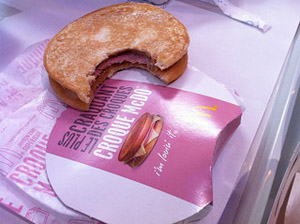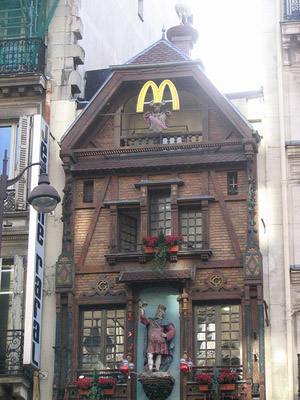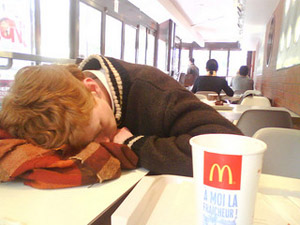When Fast Food Meets Slow Eaters

- SUBSCRIBE
- ALREADY SUBSCRIBED?
BECOME A BONJOUR PARIS MEMBER
Gain full access to our collection of over 5,000 articles and bring the City of Light into your life. Just 60 USD per year.
Find out why you should become a member here.
Sign in
Fill in your credentials below.
 When I was conducting dissertation research in Paris, France, the McDonald’s next to the Gare d’Austerlitz was a hangout for paleontology students at the Muséum d’Histoire Naturelle. To my great surprise, my friends Didier and Dodo both treated it like a normal French cafe, which is to say, they sat there all day, nursing their one paper cup of coffee. This scenario went on for years, as work on doctorates often does. I would return to Paris, head to the McDos, and Didier and Dodo would still be sitting in their seats, their noses stuck in the same books. For all I knew, they were still nursing the same five-year-old cup of coffee.
When I was conducting dissertation research in Paris, France, the McDonald’s next to the Gare d’Austerlitz was a hangout for paleontology students at the Muséum d’Histoire Naturelle. To my great surprise, my friends Didier and Dodo both treated it like a normal French cafe, which is to say, they sat there all day, nursing their one paper cup of coffee. This scenario went on for years, as work on doctorates often does. I would return to Paris, head to the McDos, and Didier and Dodo would still be sitting in their seats, their noses stuck in the same books. For all I knew, they were still nursing the same five-year-old cup of coffee.
Which is why I was amused to read about a tempest in Flushing, Queens, between a group of seniors and a McDonald’s on the corner of Parsons and Northern Boulevard. The senior citizens had been treating this McDos like their own personal living room, prompting calls to 911 four times since this past November. Arguably, this conflict represented the lowbrow end of a recent transformation inside the gourmet restaurant scene described by Alison Pearlman in her recent book, Smart Casual. As she points out, part of the early appeal of French cuisine before the arrival of JC (Julia Child) was that hardly any Americans could read le menu, and being willing to dig into expensive plates full of unpronounceable foods was a way for elites to assert their elitism.
Even at the other end of the economic spectrum, shouldn’t the reverse hold, and McDonald’s in France should stay in English? Alas, non. In Paris, a trip to a McDos can confound American tourists unprepared for fast food in translation. “Mon p’tit jus bio”? “Le Charolais?” “La vinaigrette à l’huile de noisettes?” How did le Big Mac get to be so French?
Like the internet, fast food has rules. One of them is that all code, cultural or computer, must be written in American. But as the economy goes increasingly global, those rules are being broken. At the high end, this means $100 dollar hamburgers made of Kobe beef and reservation-only restaurants serving “haute comfort food.” At the low end, it means that fast food customers misinterpret the meaning of “bistro” spaces and end up staying too long.
 I have malingered for days at various McDonald’s in Seoul, Korea, where lovely young women wearing white gloves will bow slightly, open the door with a smile, seat you ceremoniously, and serve you a burger with kimchee instead of a pickle on top. I have sat for hours in a McDo in Leipzig, which featured German beer (naturally), and the only reason I wasn’t left alone to nurse my drink in peace was because concerned Leipziggers kept on asking me if I was lost. “Nein, nein,” I answered, mustering up my very best German accent, but one helpful old lady brought me a hard sausage from a nearby store and sat down to join me, thinking that I just needed company and a good shoulder to cry on or something. I really don’t know. The point being that getting chased off was so far from their brains that they were mostly encouraging me to stay longer, drink more, and maybe consider being adopted.
I have malingered for days at various McDonald’s in Seoul, Korea, where lovely young women wearing white gloves will bow slightly, open the door with a smile, seat you ceremoniously, and serve you a burger with kimchee instead of a pickle on top. I have sat for hours in a McDo in Leipzig, which featured German beer (naturally), and the only reason I wasn’t left alone to nurse my drink in peace was because concerned Leipziggers kept on asking me if I was lost. “Nein, nein,” I answered, mustering up my very best German accent, but one helpful old lady brought me a hard sausage from a nearby store and sat down to join me, thinking that I just needed company and a good shoulder to cry on or something. I really don’t know. The point being that getting chased off was so far from their brains that they were mostly encouraging me to stay longer, drink more, and maybe consider being adopted.
I could chalk this up to having mastered the lost art of looking respectable and pathetic at the same time, but it’s also the case that “fast food” in Europe and Asia means “American food.” In the US, by contrast, “McDonald’s” is shorthand for “food you can eat with your hands and do not have to wait for.” (Free dangling preposition included with each order!) Each McDo’s functions like a little American embassy. It even obeys the same architectural rules: each restaurant is a clean utilitarian box with modern plumbing but adds a few culturally-specific details — akin to the kimchee switch in Korea and the alcoholic beverages in Germany — which makes it seem friendly and familiar to the locals. Because every McDos is an American space, it adheres to American time, which is swift, ruthless, and made of money. This does not universally apply. In France, the chain Quick is not, and nobody minds except the tourists, who think préservatif means “preservative” (it means “condom”) and chair means “chair” (it means flesh).
 The solution politicians reached in the Queens McDonald’s Incident was to expand the time limits that customers could remain seated: no longer 20 minute seating under penalty of law, but unlimited stays between 10-3 and thank you for not smoking. It was a beautiful example of diplomacy in action. Now, if only the “Défense de fumer” signs worked in Paris. Maybe the trick is to write them in English, but spell them: “Quit.”
The solution politicians reached in the Queens McDonald’s Incident was to expand the time limits that customers could remain seated: no longer 20 minute seating under penalty of law, but unlimited stays between 10-3 and thank you for not smoking. It was a beautiful example of diplomacy in action. Now, if only the “Défense de fumer” signs worked in Paris. Maybe the trick is to write them in English, but spell them: “Quit.”
Paula Young Lee is the author of several books, including Deer Hunting in Paris: A Memoir of God, Guns, and Game Meat, now available at W.H.Smith in Paris, Foyles in London, and online in print and e-book at Amazon.fr, as well as other independent and chain booksellers. Follow her on Twitter @paulayounglee.
photo 1 by Richard Allaway [CC BY 2.0], via Flickr
photo 2 by Frédérique PANASSAC [CC BY-SA 2.0], via Flickr
photo 3 by AlecSchueler [CC BY 2.0], via Flickr
More in fast food, Mc Do, McDonald's


